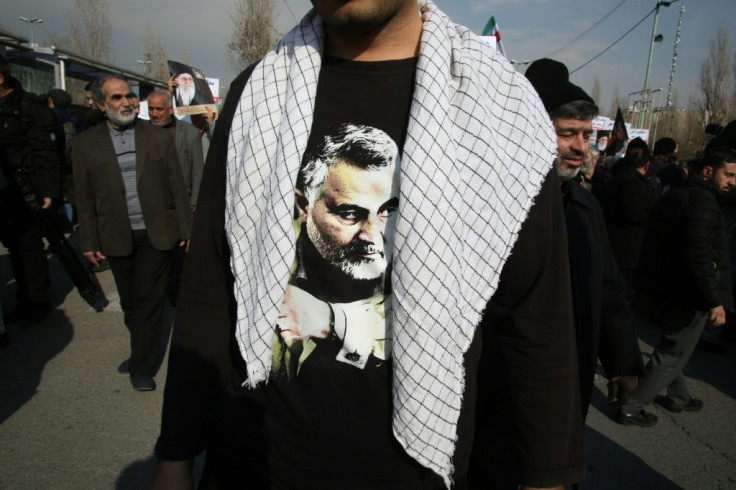Who Was Qasem Soleimani? Iranian General Killed By US Airstrike Was Elusive, Deadly, Powerful Figure

KEY POINTS
- Soleimani was very close to Supreme Leader Ali Khamenei
- Soleimani was considered the second most powerful figure in Iran
- Soleimani led led the elite Quds Forces since 1998
Qassem Soleimani, the Iranian general who was killed by a U.S. airstrike in Baghdad on Thursday, was considered a heroic figure in Iran and the second most powerful man in Teheran after Supreme Leader Ayatollah Ali Khamenei.
Soleimani, born to a peasant family in Kerman, in southeastern Iran and without much formal education, rose in 1998 to become the chief of the feared Revolutionary Guards' Quds Force, a military unit that runs Iran's overseas operations and which has been condemned as a terrorist organization by the U.S.
Known as a "shadow commander," Soleimani has since directed Iranian military operations in both Iraq and Syria.
Soleimani's troops reportedly supplied Iraqi insurgents with special bombs that could penetrate armor – a device that killed many American and coalition troops. Soleimani reportedly appeared on battlefields himself to assist Shiite Iraqi forces in their fight against Islamic State group militants.
In Baghdad, Soleimani and his Iranian-backed militias were lauded for defeating ISIS.
“The cities liberated by the militias didn’t have all the destruction that the cities relying on coalition airstrikes had,” an Iraqi politician said.
Soleimani also was believed to have aided Shia Muslim and Kurdish groups in Iraq battling against Saddam Hussein. He also assisted the Shiite militant group Hezbollah in Lebanon and Islamist terror group Hamas in the Palestinian territories.
The Pentagon said Soleimani and his soldiers were "responsible for the deaths of hundreds of American and coalition service members and the wounding of thousands more."
Soleimani was also widely considered the mastermind of Syrian President Bashar al-Assad's brutal war against rebels in Syria. With Soleimani’s help, Assad was able to turn the tide against the rebels.
U.S. officials accused of Soleimani and his Quds Force of trying to assassinate Saudi Arabia's Ambassador to the U.S. Adel al-Jubeir in Washington in 2011. That attack failed.
More recently, Soleimani was blamed by the U.S. for overseeing an attack on Dec. 27 that killed an American contractor and Iraqi personnel in Baghdad. In addition, Pentagon officials contend that Soleimani approved of the storming of the U.S. embassy in Baghdad earlier this week.
Soleimani, 62, began his military career in the Iraq-Iran war that started in the early 1980s.
"He's been in combat his entire life. His soldiers love him. He's a quiet, charismatic guy, a strategic genius and a tactical operator," Lt. Gen. Mark Hertling, a national security, intelligence and terrorism analyst, told CNN. "These are all the kind of things, looking at him from the enemy's perspective, [that] is going to create a great deal of angst in this part of the world."
In 2013, a former CIA officer named John Maguire told The New Yorker magazine that Soleimani was "the single most powerful operative in the Middle East.”
“He is the individual most responsible for the destabilization and inflammation of sectarian tensions that Iran has sown throughout the Middle East,” said Jordan Steckler, a research analyst with United Against Nuclear Iran, prior to Soleimani’s death. “Soleimani is begrudgingly considered by his adversaries to be a brilliant strategist.”
Steckler added: “Despite being outmanned, outgunned and outspent by its adversaries, Soleimani has employed tactics including terrorist attacks, covert operations and the outsourcing of fighting to foreign militias to undermine the sovereignty of neighboring states and expand Iran’s military and diplomatic influence.”
The U.S. Defense Department stated on Friday that Soleimani was "actively developing plans to attack American diplomats and service members in Iraq and throughout the [Persian Gulf] region."
Soleimani reportedly had three sons and two daughters and one of his daughters is married to the son of former Tehran Mayor Mohammad Baquer-Qalibaf.
Despite his fame in Iran, Soleimani led a quiet private life and operated in the shadows.
“Over the past two decades that he commanded the Quds Force, no photograph of his face was allowed in the Iranian media and much of Iranian society didn’t recognize his face,” said Roozbeh Mirebrahimi, an Iranian researcher based in New York.
Mirebrahimi noted Soleimani was very close to Khamenei.
“It was [during] the first few years of the revolution that [Soleimani] became acquainted with Ayatollah Khamenei, then deputy minister of defense,” he said. “And they found a close friendship. When the [Iran-Iraq] war began, he gained the trust of the senior corps commanders. By the end, he remained at the key positions.”
Steve Bucci, a visiting fellow at the Heritage Foundation, noted that “Qassem is little known in the West because he cares nothing for fame or publicity, but everything about power and ideology. The [Iranian] regime loves him.”
Indeed, earlier this year, Iran’s supreme leader awarded Soleimani the country's highest military order – the Order of Zulfaqar. Soleimani became the very first Iranian official to receive the commendation since the formation of the Islamic Republic in 1979.
© Copyright IBTimes 2024. All rights reserved.




















